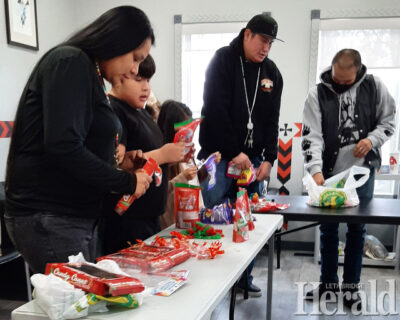IRC program ‘scours the streets’ to deliver care packages
By Cal Braid - Lethbridge Herald Local Journalism Initiative Reporter on December 17, 2022.
 Herald photo by Cal Braid
Cherie Shot Both Sides, and a group of helpers from the IPC program, assembled care packages and cards on Friday morning before heading out to deliver the gifts to the streets.
Herald photo by Cal Braid
Cherie Shot Both Sides, and a group of helpers from the IPC program, assembled care packages and cards on Friday morning before heading out to deliver the gifts to the streets.The Indigenous Recovery Coaching Program (IRC) gathered on Friday in their bustling headquarters to assemble holiday care packages.
In partnership with Collaborative Strategies Consulting Inc. and Stunt Nations, they pooled resources for the care packages and took to the streets in the afternoon to hand-deliver them to hotspots in the city. The packages contained ‘words of encouragement’ cards, necessities, and Christmas treats. The encouragement cards were provided by students at Senator Buchanan Elementary School, giving the students a chance to support those struggling on the streets with thoughtful messages and to work with the IRC, learning about their culture and traditional ways of healing. The IRC used its knowledge of where those most in need are found, “scouring the streets” and following up with other resource agencies within the community.
Cherie Shot Both Sides, Indigenous recovery coach, described the service as a place for addicts to seek guidance at any point along the stages of change model-pre-contemplation, contemplation, preparation, action, maintenance, and relapse. The IRC’s centre is a converted house on 6 Ave. South that accommodates group sessions, meals, and the staff workplace. They work with Indigenous people to create a culturally safe space and are self-described as “the only recovery coaching program that is true to the cultural, spiritual, and traditional wellness and being of our Blackfoot teachings.” They offer culturally-inspired day programs, sometimes at the centre, and sometimes at other locations. The IRC also works with other social agencies, including inpatient detox and treatment facilities to help clients fulfill their self-determined goals. The organization is federally funded by Urban Programming for Indigenous Peoples, employs 12 staff, and is open on weekends to offer peer support.
“We have a new outreach diversion peer-support team,” said Shot Both Sides. “Once the participants are ready to make the next step in recovery, that’s where we come and meet them halfway. We are more or less their professional friends in regards to recovery coaching and helping them create their recovery plan with the implementation of our culture. It’s mainly Blackfoot but recently we’ve noticed that our participants are coming from more diverse backgrounds, so we have a culture camp coming up that is consistent with Blackfoot, Cree, and Metis. A lot of our participants want that cultural aspect. That’s kind of why they come.”
“For a lot of our coaches on the peer support team, that’s our family or friends who are out there on the streets so we have very close connections and ties to everybody. We’re able to connect and reach out to them on a personal level,” she said.
In addition, “99 per cent” of the coaches and peer support staff have lived experience with addictions, and can empathize with those they’re helping.
“We really put our all into helping our participants and meeting them halfway.”
Their website includes a moving quote that offers hope to those who are suffering.
“Recovery is a path to improved quality of life by finding balance in the physical, emotional, mental, and spiritual states of well-being; guiding a life of harmony with self, community, and creation.”
10-9


